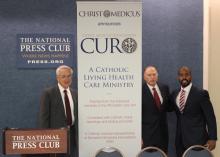Health Care

Crying out “no justice, no peace,” crowds joined the Rev. Al Sharpton in a weekend march towards the Martin Luther King Jr. Memorial, vowing not to let President-elect Donald Trump turn back strides made by the civil rights leader.
The mostly African-American throng — smaller than the thousands expected, due to the steady rain — heard from civic and religious leaders about key areas of concern: health care, voting rights, economic equality, and police brutality and reform.

Somewhere in California on June 9, a terminally ill person may lift a glass and drink a lethal slurry of pulverized prescription pills dissolved in water.
And then die.
That’s the day the nation’s most populous state implements a law, passed in 2015, making physician-assisted dying accessible to 1 in 6 terminally ill Americans, according to its national backers, Compassion & Choices.

Pope Francis has blasted employers who do not provide health care as bloodsucking leeches and he also took aim at the popular “theology of prosperity” in a pointed sermon on the dangers of wealth.

Recognizing the incredible gap (between those with health insurance and those without it) in the health care system in their area, nurse practitioners Mary Wysochansky and Anna Stinchcum decided to do something to address the problem. These two women founded and opened the Sumter Faith Clinic in Americus, Ga. The clinic serves the uninsured and the underinsured in Sumter County, Ga. Funded purely by donations and staffed by volunteers, Sumter Faith Clinic provides healthcare for those in need that tends to the body, soul, and mind. Their desire to make justice happen was possible because these two women decided to join their efforts and work for a better future.
In 2014, the U.N. Women launched a campaign to revisit and reengage with the Beijing Declaration and Platform for Action on gender equality. The slogan of the campaign is “Empowering Women, Empowering Humanity, Picture It!” The platform identified 12 areas for attention in working for the rights of women and girls: Poverty, Education, Health, Violence, Armed Conflicts, Economy, Power/Decision-Making, Institutional Mechanisms for Advancement, Human Rights, Media, the Environment, and the “Girl-child.” At the original 1995 Beijing conference, 189 countries committed to this platform for achieving gender equality and female empowerment. Beijing +20 (twenty years after the Beijing Declaration) reminds us that, while advancements in gender equality and the empowerment of women have been made, there is still much work to do.

THIS SUMMER’S ATTEMPT to dismantle the Affordable Care Act began as the very height of frivolous lawsuits. Cooked up with the help of the Competitive Enterprise Institute, a libertarian think tank, the case (King v. Burwell) depended upon a very narrow reading of four words in Section 36B of the ACA: “established by the State.”
Essentially, Obamacare foes argued that Congress intended to provide health-care subsidies (or tax credits) only to those Americans living in states with state-operated insurance exchanges. Those who lived in states without exchanges—including Florida, Texas, Wisconsin, and others—and were, therefore, dependent upon the federal exchange would be ineligible for subsidies.
Of course, Congress intended no such thing—as the Supreme Court upheld. Throughout dozens of hearings and hundreds of hours of debate, it was clear that ACA subsidies would be available to every American, regardless of what state they lived in.
In a 6-3 ruling, the court rejected King, with Chief Justice Roberts explaining, “A fair reading of legislation demands a fair understanding of the legislative plan. Congress passed the Affordable Care Act to improve health insurance markets, not to destroy them.”
Had the suit carried the day, 6.4 million Americans would have lost their subsidies.

IN OAKLAND, CALIF., schools and other nontraditional sites host health clinics that provide both primary care and preventive health services for area residents, many of whom are uninsured.
In south Los Angeles, mental health professionals have created programs based on nutrition and group exercise, along with peer-to-peer education about the transmission of HIV/AIDS. Community groups, faith-based organizations, schools, and health providers are coming together in Albuquerque, N.M., to enroll hundreds of children in Medicaid and start neighborhood walking groups—part of an effort to break down walls between health-care providers and their patients
The U.S. health-care system is known for treating advanced-stage illnesses with expensive therapies that are often not accessible to those without health insurance. So if these low-cost, preventative programs in Oakland, LA, and Albuquerque don’t sound like the typical U.S. approach to health, you’re right: These and other community-based efforts trace their inspiration to the remarkably successful health system built by the nation of Cuba.


Human slavery has been in existence for thousands of years and unfortunately still flourishes today. An estimated 36 million slaves exist — perhaps more than any time in history —in countries around the world, even the U.S.
“You shall not pervert the justice due to the sojourner or to the fatherless, or take a widow’s garment in pledge.” —Deuteronomy 24:17
This verse names the three populations most vulnerable to exploitation: those living in a foreign country, children without parents, and women without protection. These populations have always been the most vulnerable to human trafficking, and they remain so today.
Hope for Justice aims to end human trafficking in our lifetime. And one priority to achieve that in the U.S. is training healthcare professionals to recognize victims of human trafficking. Almost 88 percent of victims of domestic sex trafficking encounter healthcare professionals while they are being trafficked.

If you are a Christian who doesn’t smoke, abstains from sex outside your heterosexual marriage and can get your priest to vouch that you go to church at least three times a month, you may qualify for a new Catholic alternative to health insurance.
Taking a cue from evangelicals, a group of traditionalist Catholics on Oct. 2 unveiled a cost-sharing network that they say honors their values and ensures that they are not even indirectly supporting health care services such as abortion that contradict their beliefs.
Christ Medicus Foundation CURO, as the group is called, will be financially integrated with Samaritan Ministries International, which was launched in 1991 by an evangelical home-schooling dad. The SMI network now serves 125,000 people and is exempt from the Affordable Care Act.
“Think about the Gospels and how the Apostles lived,” said CMF CURO director Louis A. Brown Jr. at the program’s Washington, D.C., debut. “They very much shared and cared for each other. And we’re saying: ‘Catholics, you can do that too.’”

Five things to know about one of the most anticipated Supreme Court decisions of the year:
1. Corporations can’t pray, but they do have religious rights.
Hobby Lobby isn’t a person. It’s a chain of crafts stores owned by a religious family. And though the evangelical Green family objects to parts of the Affordable Care Act’s emergency contraception mandate, it’s not the Greens but the company that writes the check for employees’ health insurance. The first question the justices had to answer was this: Does Hobby Lobby have religious rights? To many Americans, this sounds a little nutty. Does a craft store believe in God?
A majority of the justices held that a closely held company such as Hobby Lobby does have religious rights. The court didn’t apply those rights, however, to publicly held corporations, where owners’ religious beliefs would be hard to discern.
But well before the justices had delivered their verdict on this question, many legal scholars said they wouldn’t be surprised were they to affirm the company’s religious rights. American corporations do have some of the rights and responsibilities we usually associate with people. And in the 2010Citizens United campaign finance case, the justices overturned bans on corporate political spending as a violation of freedom of speech — corporations’ free speech.

On one Friday earlier this month, more than 11,000 Muslims in mosques across the country heard a sermon about the Affordable Care Act.
Jewish women’s groups have visited college campuses to get students who think they’re “invincible” to sign up for health insurance.
As the national March 31 deadline for health insurance enrollment looms and with President Obama’s encouragement, organizations across a range of faiths are working to sign up uninsured Americans for coverage under Obamacare.


SEVERAL YEARS AGO, before Congress passed the Affordable Care Act, many people were clear on the need to get health care for our brothers and sisters and joined in the push to reform the delivery system for health care in this country. When it was enacted, we were thrilled that those who had such difficulty getting even the most basic care for themselves and their children would finally have some health security.
But the notorious website problems—including the crashes, the inability to access it, the insurance programs that have been canceled, and the smaller-than-expected number of people who have been enrolled—have frustrated, discouraged and sometimes challenged us. This has been complicated by political bombast and in some cases, sadly, vicious character assassinations.
As people of faith, it is important not to be swept up in these problems, but to relentlessly pursue access to health care for the 48 million people who do not have health insurance today. We also need to remember that the ACA is more than a website. Think of the millions of young adults who can now stay on their parents’ insurance and the thousands of small businesses that have received tax credits for providing insurance to their employees.
The new rules that guarantee comprehensive insurance coverage, no barriers to preventive care, no pre-existing condition limits, and no lifetime limits on coverage have already made a huge difference in the lives of many families. The portion of the law that requires insurance companies to spend 80 to 85 percent of premium revenue on actual care rather than profits or dividends to shareholders will do much to make the cost of insurance more reasonable.

I’m a big fan of the TV show Mad Men, which takes place in the midst of the Madison Avenue advertising agencies back in the ’60s and ’70s. Sure, I enjoy the drama and the “cool factor” of Don Draper and his cavalier ad team. But for me, the most fascinating part is all of the cultural norms of the time that seem fairly shocking now, only a few decades later.
Of course, there’s all the drinking and smoking in the office, but beyond that, the way that non-Anglo employees and the women in the workplace are treated would today be grounds for a lawsuit, if not public shaming for such brazen chauvinism. The thing that’s hard to remember is that, although we see such behavior as morally offensive today, it was simply normal back then.

Yes, President Obama said that if we like our health insurance, we can keep it.
Yes, that turned out to be false for a few million people.
Yes, the president chose his words poorly. Whether or not health reform became the law of the land, there’s no way any president could have known if we’d be able to keep our health insurance from one year to the next.

The theatrics around the Affordable Care Act seem only to be matched by the public’s ignorance about what it actually is. Case in point: when late-night talk show host Jimmy Kimmel sent a reporter out on the street to ask people their opinions, they felt markedly better about the nuts and bolts of the Affordable Care Act than they did about Obamacare.
Never mind they’re the same thing (sigh).
It seems that a handful of lawmakers have seen to it that our ignorance is sown into full-blown fear, obfuscating the fact that the shutdown – which was largely a fight over the ACA – cost our economy about $25 billion. For those who have been following even on a cursory level, the arguments against the ACA are becoming quite familiar:
· The individual mandate infringes on my freedom not to have insurance.
- The whole thing costs too much.
- It’s a slippery slope to a single-payer system.
On this last point, we can only hope the critics are right, particularly since a single-payer health care system is the only model that has offered hard evidence of both covering everyone and reducing total costs. But since we’re not there yet, let’s consider what we do have with this new law.

This morning a Canadian woman wrote such an interesting comment on an old post of mine, "Rationing is not a four-letter word," that I want to share it with you. I don't know the author, her full name (though she tells me her first name is LaVonne, so she's obviously a great person), or her contact information, so I can't give her full credit. But thanks, LaVonne-in-Canada: I learned a lot from you.
Here's what she wrote about how Canadian health care works for her. I've added a few comments in italics, in case you want to compare the situation of LaVonne-in-Canada with that of LaVonne-in-the-United-States.

As people of faith, we sometimes don’t take time to prepare ourselves for what is ahead. With so many things vying for our time and attention, it is difficult to educate ourselves about all facets of critical matters. Even in our relationship with God, we gloss over important details that will guide us into a closer walk and become content with a distant half-hearted relationship. However, a casual walk with God is not one we should settle for. By delving into God’s Word, we are able to draw upon God’s wisdom for guidance and find a deeper relationship with God as we travel through this journey of life.
In a similar fashion, we cannot settle for casual knowledge of the Affordable Care Act, which is now upon us and “gives Americans unprecedented information about the health plan choices in their own communities.” The Kaiser Family Foundation reports in a recent poll that 51 percent of all Americans are still unsure about how the ACA will affect them. 42 percent of Americans thought that Congress had overturned the act or that the Supreme Court had ruled it unconstitutional. And, many Americans worry that they will have to shell out more money due to the new health reform law. This uneasiness and misinformation certainly warrants a closer look as we journey through the multiple avenues of the Affordable Care Act.

An effort to tweak President Obama’s health care reform bill to fill a gap for church health insurance plans could fail because of Republicans’ insistence on repealing the law.
Without a fix, United Methodist Church leaders say some of their churches could drop current coverage for employees once “Obamacare” takes full effect next year, according to Colette Nies, spokeswoman for the UMC’s General Board of Pension and Health Benefits.
Under Obama’s 2010 Affordable Care Act, more than 50 percent of UMC clergy would qualify for tax credits available to lower- and middle-class families to purchase insurance. But because of the way the law was written, those tax credits cannot be used toward insurance plans churches can offer through government-run exchanges.

Opponents of Obamacare like to talk about how long it takes to get a hip replacement in, say, Canada —even though the Affordable Care Act is nothing like the Canadian health plan. Let's put this in perspective. How about a system that charges so much that some middle-class insured people can't afford a hip replacement at all?
... Unless they fly to a Western European country with "socialized" medicine and pay out-of-pocket?
Check out this story about Michael Shopenn, a man whose artificial hip was manufactured in Warsaw, Indiana, a "global center of joint manufacturing." Shopenn, who had health insurance, could not get coverage for a hip operation because his insurer deemed it a pre-existing condition (note: that should no longer be a problem under the ACA). So he ended up flying to Belgium.